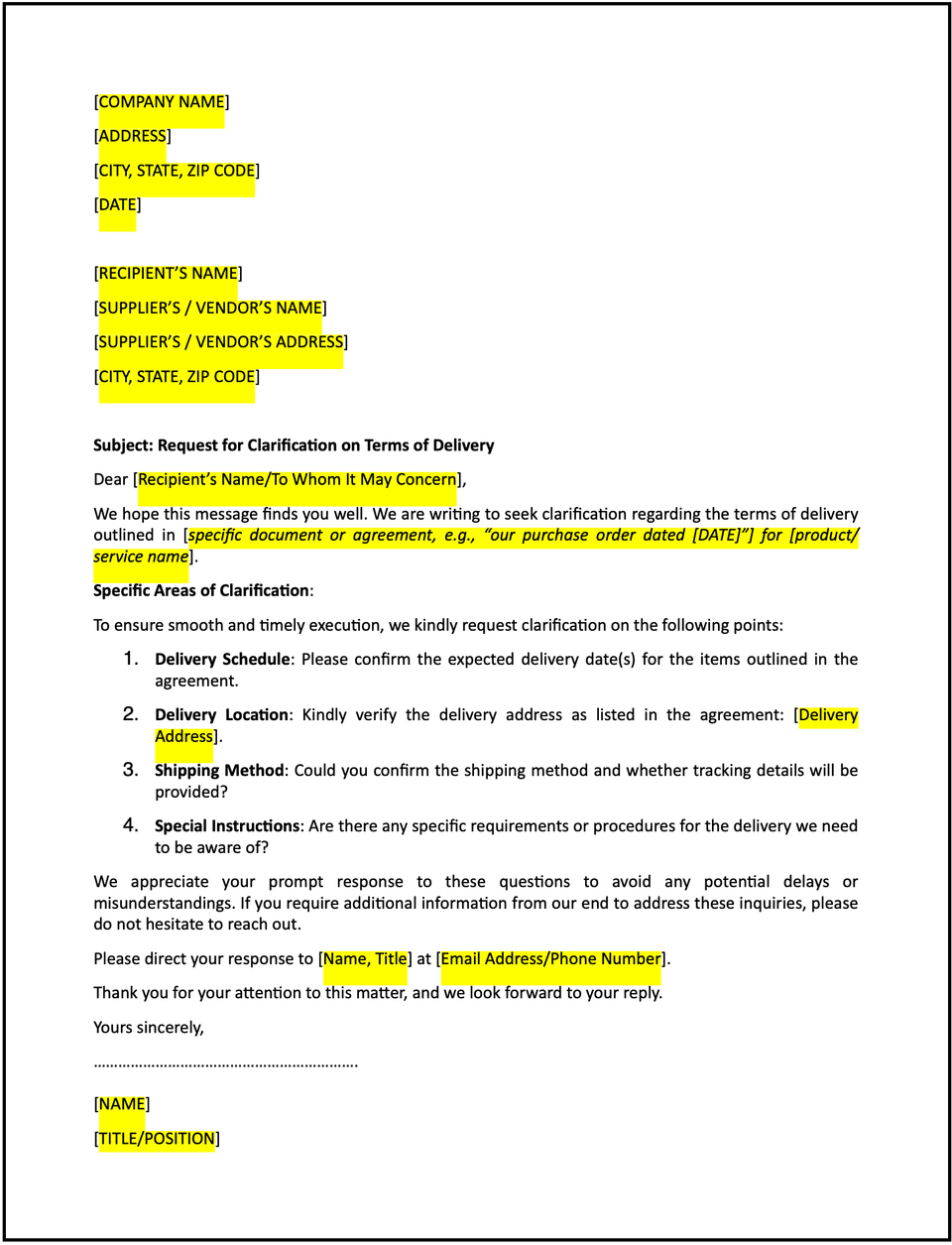Letter of request for clarification on terms of delivery: Free template

Letter of request for clarification on terms of delivery
A letter of request for clarification on terms of delivery is a formal communication used to seek additional details or resolve ambiguities regarding delivery terms outlined in a contract or agreement. This letter ensures clear understanding, avoids potential miscommunication, and facilitates a smooth transaction.
How to use this letter of request for clarification on terms of delivery
- Open with an introduction: Address the recipient respectfully and reference the agreement, order, or prior discussions about the delivery.
- State the purpose: Clearly communicate your intent to seek clarification on specific delivery terms or conditions.
- Specify the areas of concern: Identify the details that need clarification, such as timelines, shipping methods, packaging requirements, or delivery locations.
- Explain the need for clarification: Briefly describe why understanding these terms is critical for planning, compliance, or operations.
- Request a response: Politely ask the recipient to provide further details or confirm the terms in question.
- Offer collaboration: Indicate your willingness to discuss the terms further to ensure mutual understanding.
- Maintain a professional tone: Ensure the letter is clear, respectful, and focused on fostering a constructive dialogue.
- Provide contact information: Include details for the recipient to reach out with their response or schedule a discussion.
Benefits of using a letter of request for clarification on terms of delivery
This letter ensures a structured and professional way to address ambiguities, fostering clarity and collaboration. Here’s how it helps:
- Promotes understanding: Requesting clarification ensures all parties interpret delivery terms consistently.
- Reflects professionalism: A well-crafted letter demonstrates respect and attention to detail.
- Prevents delays: Addressing ambiguities early avoids potential disruptions or disputes.
- Encourages collaboration: Open communication fosters a cooperative and constructive relationship.
- Supports compliance: Ensuring clear terms helps align operations with contractual obligations.
Tips for writing an effective letter of request for clarification on terms of delivery
- Be specific: Clearly identify the delivery terms or conditions that need clarification.
- Use professional language: Maintain a respectful and constructive tone to encourage cooperation.
- Provide context: Briefly explain how the clarification will support planning or execution.
- Highlight mutual benefits: Emphasize that resolving ambiguities benefits both parties.
- Include actionable steps: Share clear instructions for responding or scheduling a discussion.
- Keep it concise: Focus on the key points while ensuring the tone is professional and solution-oriented.
Frequently asked questions (FAQs)
Q: What details should I include in this letter?
A: Include the agreement or order reference, the specific delivery terms in question, and a polite request for clarification.
Q: Should I personalize the letter?
A: Yes, addressing the recipient by name and referencing specific discussions or agreements demonstrates attentiveness.
Q: Who typically sends this letter?
A: Procurement managers, logistics teams, or business owners typically send this letter.
Q: How formal should this letter be?
A: The tone should be professional and respectful, focusing on fostering understanding and cooperation.
Q: When should this letter be sent?
A: Send the letter as soon as ambiguities or uncertainties are identified to avoid delays or conflicts.
Q: Can this letter suggest potential solutions or adjustments?
A: Yes, proposing ideas or adjustments can help streamline discussions and foster collaboration.
Q: Is acknowledgment from the recipient required?
A: While not mandatory, requesting acknowledgment ensures the recipient is addressing the request.
This article contains general legal information and does not contain legal advice. Cobrief is not a law firm or a substitute for an attorney or law firm. The law is complex and changes often. For legal advice, please ask a lawyer.


